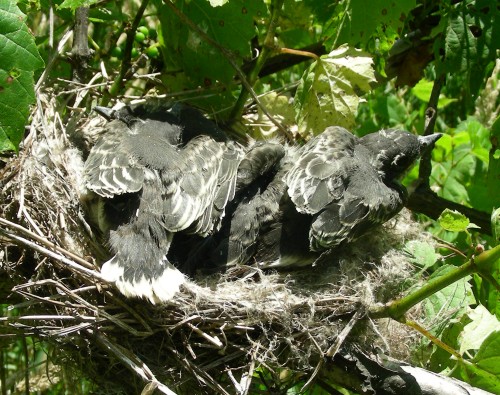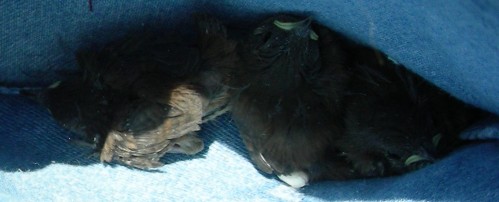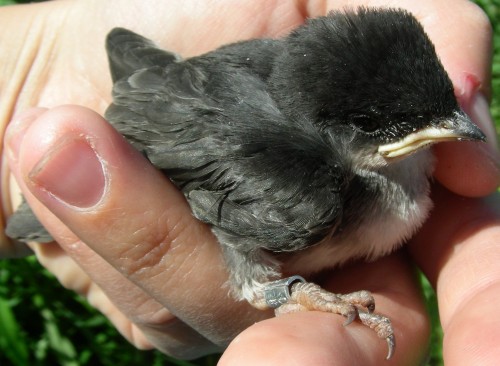Bander-in-charge:
Marie-Anne Hudson
Assistants: Dave Bird, Shawn Craik, Gay Gruner, Chris Murphy,
Rodger Titman
Notes:
June has come and gone at an incredible
rate – leaving us wondering where the summer’s gone! Our first census
of the summer season was conducted on the 11th of June, and they've been
going about once or twice a week since then thanks to our loyal
censusers (please see above).
The average number of species seen during each visit ranged
between 29 and 39, however the total number of species observed during
the month of June was a respectable 60, an increase from the 52 observed
during this period last year.
Much
like last year at this time,
most of the
birds that have remained at MBO have settled down to breed, becoming
quite quiet. Most noticeably, the Common Yellowthroats have almost
completely ceased singing, opting instead to skulk around the bushes and
‘cheack’ at you as you walk by. The Rose-breasted Grosbeaks and
Warbling Vireos, once so vocal it was hard to hear anything else, have
fallen completely silent. Our birds have not wasted any time: we’ve had
young Wood Ducks, Canada Geese, House Sparrows, Eastern Kingbirds (a
first as far as we know for MBO), American Robins, Red-winged
Blackbirds, Tree Swallows, House Wrens, and… Great-crested Flycatchers!
Though these young are still in the egg (in one of the nest boxes we’re
keeping a close eye on), we still count them as young-to-be.
|

These young Eastern Kingbirds settled back into their nest
quite nicely after being banded.
Not shown in the photo, momma Kingbird was hovering nearby
the entire time, keeping
a watchful eye on her young.
(Photo by Marie-Anne Hudson)
|
The list of birds banded this month is comprised
almost entirely of almost-fledged juveniles, with the exception of one
second-year female Tree Swallow who was quickly banded after she
wouldn’t budge off her nest of newly hatched young.
This month's top 10 [last week of spring's rank in
brackets]
|
#
individuals banded |
mean # individuals observed daily |
|
Tree Swallow (20) |
Red-winged Blackbird (42.3)
[1] |
|
House Wren (6) |
American Goldfinch (14.3) [4] |
|
Eastern Kingbird (4) |
Tree Swallow (14.3)
[3] |
|
|
American Crow (14)
[2] |
| |
Yellow Warbler (9) [6] |
| |
Cedar Waxwing (7.7) [5] |
| |
Song Sparrow (7)
[8] |
| |
Baltimore Oriole (6.5) [-] |
| |
Common Yellowthroat (5.3) [7] |
| |
American Robin (4.5)
[-] |
|
The ten species most frequently observed this
month were roughly the same as the last week of the spring season,
though their order of abundance changed somewhat, and a couple of
additions were made. Red-winged Blackbirds continue to dominate, while
American Goldfinch and American Crow have traded spots, as have Yellow
Warbler and Cedar Waxwing. Overall, this list represents the most
common breeding species at MBO. Seven of last June's top 8 species
are in this year's top 10, with the lone exception being Ring-billed
Gull; Red-winged Blackbird and American Goldfinch also held the top two
places in 2006.
The vegetation has really gone wild, with some of
the grasses in the meadow now taller than most of us (but probably not
Marcel). This makes it all the more difficult to locate dropped items,
such as the small mirrors we carry to quickly check the contents of the
nest boxes! We hope to continue censusing throughout July, and will
begin to gear up for the upcoming fall season soon. There will be much
vegetation management to do, so we are on the lookout for hard-working
volunteers to help us tame those thickets! Along those lines, we would
like to extend a HUGE thank you to Maria, Barbara and Peter Frei (no
relation) for spending several hot summer days working on MBO’s newest
installation: the composting toilet! We hope to have it up and running
in time for the fall season, and cannot thank them enough for their
wonderful craftsmanship and all-around hard work. Sincere thanks
also to Sun-Mar, who provided the
toilet at a considerable discount.
|

These little guys were the first juvenile House Wrens ever
banded at MBO.
(Photo by Marie-Anne Hudson)
|



